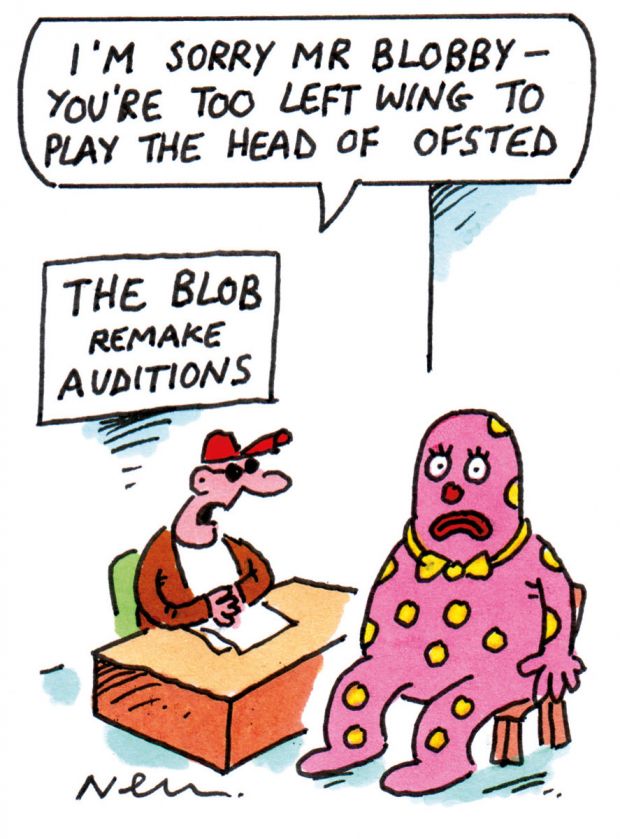
- Education secretary Michael Gove has renewed his attack on “the Blob” – aka the “bloated educational bureaucracy” lurking in schools, local education authorities and, mostly, university education faculties. In a salvo directed at education academics who he believes were “complicit in under-performance in the past”, Mr Gove said rising school standards on his watch showed that the left-wing educational establishment is being defeated, The Guardian reported on 4 February. Taking on the role of Steve McQueen, who battled the unstoppable alien mass in the 1958 horror film of the same name, Mr Gove hinted that his victory over the Blob might result in state schools becoming as good as private ones. However, former Ofsted head Sir David Bell, vice-chancellor of the University of Reading, has suggested that Mr Gove’s enemy might be a convenient fiction. “While the Blob is a useful political tool in the short term, it simply might not be as deep-rooted as the education secretary believes,” Sir David said on The Conversation website.
- US superstar Beyoncé is to become the focus of a course at Rutgers University, the Daily Mail reported on 31 January. The New Jersey institution will offer a programme, “Politicizing Beyoncé”, which will explore the pop diva’s various alter egos, such as performer, role model, fashion designer, mother and wife, the paper said. “While other artists are simply releasing music, she’s creating a grand narrative around her life, her career and her persona,” said Kevin Allred, the doctoral student teaching the course. Students will analyse lyrics sung by the former Destiny’s Child singer – an honour already bestowed on Beyoncé’s rapper husband by Georgetown University, which teaches “The Sociology of Hip-Hop: The Urban Theodicy of Jay-Z”.
- Universities and science minister David Willetts used his response to the Finch Group’s recent reconvention to assure the sector that all was well with the UK’s open access policy (even if reality was dragging its feet about falling in line with it). In a letter to the group’s chair, Dame Janet Finch, made public on 31 January, Mr Willetts welcomes the group’s reiteration that a “clear policy direction should be set towards support for gold open access”. He retains his own “strong preference” for the journal-provided form over the repository-provided green variety, but admits he is finally looking into carrying out a full cost-benefit analysis of the policy. He also urges publishers to make greater efforts to reduce universities’ subscription bills as their payment of open access fees increases. Despite the rest of the world’s preference for green open access, he cites the example of the Netherlands, which recently unveiled a gold-friendly policy, as proof that the argument could still be won.
- Politicians might be interested in a game doing the Westminster rounds. By typing someone’s name into Google after the word “is”, they can see what people are asking about them, reports The Sunday Times’ Roland White on 2 February. Most intriguing is the predictive text appearing after the name of the home secretary, higher education’s current bête noire for her unhelpful stance on student visas (“Is Theresa May turning into [model and actress] Cara Delevingne?”). The shadow higher education minister may be pleased about his Google results (“Is Liam Byrne married?”), while the business secretary will be baffled by questions asked about him (“Is Vince Cable a freemason?”). And it’s bad news for the universities and science minister, of whom people ask: “Who is David Willetts?”
- The University of Strathclyde is under fire for spending £1.2 million on a grace-and-favour home for its principal Sir Jim McDonald. Politicians and union officials have criticised the purchase of the five-storey Glasgow townhouse as universities insist they cannot afford to improve on the 1 per cent pay offer for staff, said The Herald on 2 February. The new home, which will also be used for university events, is needed to replace the principal’s current apartment at Strathclyde’s Jordanhill campus, which is set to close this summer, a spokesman said. But Mary Senior, Scotland official at the University and College Union, said she was astonished that Strathclyde was “buying a luxury townhouse in one of Glasgow’s plushest postcodes” while “pleading poverty” over pay.
